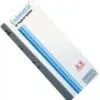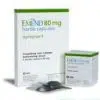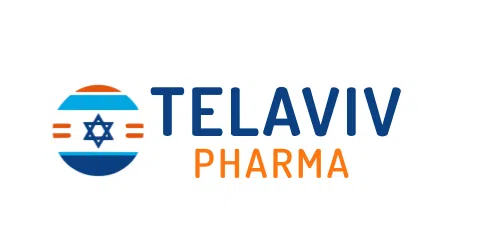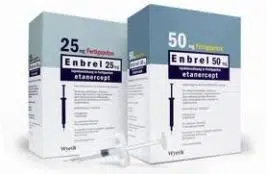No products in the cart.
Return To ShopEnbrel
Enbrel (etanercept) is a TNF blocker administered by subcutaneous injection to treat inflammatory autoimmune conditions including rheumatoid arthritis, psoriatic arthritis, ankylosing spondylitis, juvenile idiopathic arthritis, and plaque psoriasis. This biologic medication works by blocking tumor necrosis factor (TNF), a key inflammatory protein that drives joint damage and immune system inflammation. For patients seeking effective arthritis medications, working with rheumatologists ensures proper screening and monitoring, as Enbrel carries significant risks including serious infections, malignancies, and requires careful patient selection and ongoing medical supervision for safe and effective treatment of these chronic autoimmune conditions.
- Prescription Required
| Brand | Form | Price | Qty | Action |
|---|---|---|---|---|
| Enbrel Brand | 25mg 4 Injection | $1,220.00 | ||
| Enbrel Brand | 50mg 4 Injection | $2,417.00 |
- Please note all prices are in US dollars
Enbrel (Etanercept) – Complete Product Information
Enbrel (etanercept) represents a revolutionary advance in treating inflammatory autoimmune diseases, functioning as the first FDA-approved tumor necrosis factor (TNF) blocker. As a dimeric fusion protein consisting of the extracellular ligand-binding portion of the human 75 kilodalton TNF receptor linked to the Fc portion of human IgG1, Enbrel provides targeted therapy that addresses the underlying inflammatory cascade driving these debilitating conditions.
TNF is a naturally occurring cytokine that plays a central role in normal inflammatory and immune responses, but becomes overproduced in autoimmune conditions like rheumatoid arthritis, psoriatic arthritis, ankylosing spondylitis, and plaque psoriasis. Elevated TNF levels contribute to joint destruction, systemic inflammation, and the progressive disability characteristic of these diseases. Enbrel works by binding to TNF molecules and preventing their interaction with cellular TNF receptors, effectively neutralizing TNF’s biological activity.
Mechanism of Action and Therapeutic Effects: Etanercept functions as a dimeric soluble form of the p75 TNF receptor, creating large complexes with TNF-alpha and TNF-beta (lymphotoxin alpha), rendering these inflammatory cytokines biologically inactive. Unlike some other TNF blockers, etanercept doesn’t cause cell lysis in the presence or absence of complement, and large complexes with TNF aren’t readily detected in laboratory studies.
By neutralizing TNF activity, Enbrel can modulate numerous biological responses that drive autoimmune inflammation. This includes reducing expression of adhesion molecules responsible for leukocyte migration (such as E-selectin and ICAM-1), decreasing serum levels of inflammatory cytokines like IL-6, and reducing matrix metalloproteinase-3 levels that contribute to joint destruction.
Clinical Applications and Approved Indications: Enbrel has demonstrated remarkable efficacy across multiple autoimmune conditions. In rheumatoid arthritis, the medication reduces signs and symptoms, induces major clinical responses, inhibits structural joint damage progression, and improves physical function. For psoriatic arthritis, Enbrel addresses both joint inflammation and skin manifestations, providing comprehensive disease control.
In ankylosing spondylitis, Enbrel reduces characteristic back pain and stiffness while improving spinal mobility and overall function. For plaque psoriasis patients, the medication can achieve dramatic skin clearance, with many patients experiencing 75% or greater improvement in psoriasis severity scores. In pediatric patients with juvenile idiopathic arthritis, Enbrel offers hope for maintaining normal growth and development while controlling joint inflammation.
Administration and Dosing Flexibility: Enbrel’s subcutaneous administration allows for convenient at-home injection after proper training. The medication is available in multiple formulations including prefilled syringes, autoinjectors, and multiple-use vials, providing dosing flexibility for different patient needs. Adult patients typically receive 50mg weekly, while pediatric dosing is weight-based at 0.8mg/kg weekly with a 50mg maximum.
Pharmacokinetic Profile and Duration of Action: Following subcutaneous injection, etanercept demonstrates a half-life of approximately 102 hours, allowing for once or twice-weekly dosing depending on the condition being treated. The medication reaches peak serum concentrations within 69 hours and shows a 2-7 fold increase in peak concentrations with repeated dosing, achieving steady-state levels that maintain therapeutic TNF blockade.
Serious Safety Considerations and Black Box Warnings: Enbrel carries FDA black box warnings for serious infections and malignancies. The medication significantly increases infection risk, including tuberculosis reactivation, invasive fungal infections, and opportunistic pathogens. All patients require tuberculosis testing before starting treatment, and ongoing monitoring for infection signs throughout therapy.
Lymphoma and other malignancies have been reported, particularly in pediatric patients. The medication can cause or worsen heart failure, neurological conditions like multiple sclerosis, and hematologic abnormalities including pancytopenia. Hepatitis B reactivation, autoimmune conditions, and serious allergic reactions represent additional significant risks requiring careful monitoring.
Patient Selection and Monitoring Requirements: Successful Enbrel therapy requires careful patient selection and comprehensive monitoring. Candidates must undergo thorough screening for active infections, tuberculosis exposure, malignancy history, and cardiovascular status. Patients need regular monitoring for infection signs, complete blood counts, liver function, and disease activity assessments.
For patients managing complex autoimmune conditions, Enbrel offers significant therapeutic potential when used appropriately under specialist supervision. Those exploring biologic therapy options should work with experienced rheumatologists who can coordinate comprehensive care including infection screening, vaccination updates, and combination therapy strategies. Patients seeking affordable biologic treatment options should understand that while Enbrel represents advanced therapy, the medication requires extensive medical monitoring and should never be used without appropriate specialist oversight and regular safety assessments, as the risks associated with TNF blockade require ongoing medical expertise for safe long-term management.
| Brand | Enbrel Brand |
|---|---|
| Form | 25mg 4 Injection, 50mg 4 Injection |
Enbrel can cause a wide range of side effects from common injection site reactions to life-threatening infections and malignancies. Understanding these risks is crucial for safe treatment, as the medication's immunosuppressive effects require careful monitoring and patient education about warning signs.
Most Common Side Effects (>5% of patients):
- Infections (various types): Upper respiratory tract infections, sinusitis, influenza - most frequent adverse reactions
- Injection site reactions - 37% in rheumatology patients, 15% in psoriasis: Erythema, itching, pain, swelling, bleeding, bruising
- Upper respiratory infections: Including nasopharyngitis, sinusitis, and influenza-like symptoms
- Headache: Generally mild to moderate intensity
- Diarrhea: Gastrointestinal upset requiring symptom management
Serious Infection Risks (Black Box Warning):
- Tuberculosis reactivation: Including disseminated and extrapulmonary TB, even in patients previously treated
- Invasive fungal infections: Histoplasmosis, coccidioidomycosis, candidiasis, aspergillosis, blastomycosis, pneumocystosis
- Bacterial infections: Pneumonia, cellulitis, septic arthritis, sepsis, abscess, osteomyelitis
- Opportunistic pathogens: Legionella, Listeria, and other unusual infections
- Viral infections: Reactivation of latent viruses, including herpes zoster
- Atypical mycobacterial infections: Non-tuberculosis mycobacterial diseases
Malignancy Risks (Black Box Warning):
- Lymphoma: 3-fold higher rate than general population, particularly in rheumatology patients
- Pediatric malignancies: Lymphomas and other cancers in children/adolescents, some fatal
- Leukemia: Acute and chronic forms reported in association with TNF blocker use
- Melanoma: Increased rates compared to general population
- Non-melanoma skin cancer: Higher incidence, particularly in psoriasis patients
- Merkel cell carcinoma: Rare but aggressive skin cancer reported
- Other solid tumors: Various malignancies across different organ systems
Cardiovascular Side Effects:
- Congestive heart failure: New onset or worsening of existing CHF, including in young patients
- Higher mortality risk: Increased death rates in heart failure patients in clinical trials
- Chest pain: Cardiac-related discomfort
- Angioedema: Potentially life-threatening swelling reactions
Neurological Side Effects:
- Central nervous system demyelination: Multiple sclerosis, optic neuritis, transverse myelitis
- Peripheral demyelination: Guillain-Barré syndrome, other peripheral neuropathies
- Seizure disorders: New onset or exacerbation of existing seizures
- Mental status changes: Cognitive disturbances associated with demyelinating conditions
- Paresthesias: Numbness and tingling sensations
- Convulsions: Seizure activity requiring medical evaluation
Hematologic Side Effects:
- Pancytopenia: Dangerous reduction in all blood cell types
- Aplastic anemia: Bone marrow failure, potentially fatal
- Anemia: Reduced red blood cell counts
- Leukopenia: Decreased white blood cell counts increasing infection risk
- Neutropenia: Reduced neutrophils, particularly with combination therapy
- Thrombocytopenia: Low platelet counts affecting blood clotting
- Lymphadenopathy: Enlarged lymph nodes requiring investigation
Hepatic Side Effects:
- Hepatitis B reactivation: Potentially fatal reactivation in carriers
- Autoimmune hepatitis: Immune-mediated liver inflammation
- Elevated transaminases: Liver enzyme elevations indicating hepatic stress
- Liver function abnormalities: Various hepatic parameter changes
Autoimmune and Immune System Effects:
- Lupus-like syndrome: Development of lupus symptoms and autoantibodies
- Autoantibody formation: ANA, anti-DNA, anticardiolipin antibodies
- Systemic vasculitis: Inflammation of blood vessels
- Sarcoidosis: Granulomatous inflammatory disease
- Macrophage activation syndrome: Severe inflammatory condition
Gastrointestinal Side Effects:
- Inflammatory bowel disease: New onset or worsening IBD, particularly in pediatric patients
- Nausea and vomiting: Digestive system upset
- Abdominal pain: Gastrointestinal discomfort
- Diarrhea: Loose stools requiring management
Respiratory Side Effects:
- Interstitial lung disease: Lung tissue inflammation and scarring
- Upper respiratory infections: Frequent viral and bacterial respiratory illnesses
- Pneumonia: Serious lung infections requiring hospitalization
- Respiratory failure: Severe complications from pulmonary infections
Dermatologic Side Effects:
- Cutaneous lupus erythematosus: Skin manifestations of lupus
- Cutaneous vasculitis: Blood vessel inflammation in skin
- Stevens-Johnson syndrome: Severe skin and mucous membrane reactions
- Toxic epidermal necrolysis: Life-threatening skin detachment
- Erythema multiforme: Target-like skin lesions
- Subcutaneous nodules: Firm lumps under the skin
- Worsening psoriasis: Paradoxical worsening including pustular forms
Ocular Side Effects:
- Uveitis: Eye inflammation affecting vision
- Scleritis: Inflammation of the white part of the eye
- Optic neuritis: Optic nerve inflammation causing vision problems
Injection Site Reactions (Detailed):
- Local erythema: Redness at injection site
- Swelling and induration: Firm, raised areas
- Pain and tenderness: Discomfort lasting 3-5 days
- Itching and burning: Local irritation symptoms
- Bleeding and bruising: Minor trauma at injection site
- Secondary site reactions: Reactions at previous injection sites with subsequent doses
Immunogenicity and Antibody Formation:
- Anti-etanercept antibodies: Non-neutralizing antibodies in ~6% of patients
- Increased antibody formation: Higher rates with longer treatment duration
- Clinical significance unclear: No clear correlation with efficacy or safety
Drug Interaction-Related Effects:
- Enhanced infection risk: With anakinra, abatacept, or other immunosuppressants
- Neutropenia risk: Particularly with anakinra combination
- Decreased vaccine responses: Reduced effectiveness of vaccinations
- Live vaccine complications: Risk of vaccine-induced infections
Metabolic and Endocrine Effects:
- Hypoglycemia: Low blood sugar in diabetic patients requiring medication adjustments
- Weight changes: Possible weight gain or loss
Age-Related and Special Population Effects:
- Pediatric malignancy risk: Higher cancer risk in children and adolescents
- Elderly infection susceptibility: Increased infection risk in older patients
- Compromised immune response: Reduced ability to fight infections across age groups
Long-term Treatment Complications:
- Progressive immunosuppression: Cumulative effects on immune system
- Chronic infection predisposition: Ongoing susceptibility to unusual pathogens
- Malignancy surveillance needs: Regular cancer screening requirements
- Vaccine efficacy reduction: Decreased protection from immunizations
Emergency and Life-Threatening Reactions:
- Anaphylaxis: Severe allergic reactions requiring immediate treatment
- Sepsis and septic shock: Life-threatening systemic infections
- Respiratory failure: From severe pneumonia or lung disease
- Fatal malignancies: Aggressive cancers, particularly in pediatric patients
- Aplastic anemia: Potentially fatal bone marrow failure
Monitoring and Warning Signs:
- Infection symptoms: Fever, fatigue, flu-like symptoms, unusual infections
- Malignancy signs: Unexplained lumps, persistent symptoms, unusual lesions
- Hematologic abnormalities: Easy bruising, bleeding, persistent infections
- Neurological changes: Vision problems, weakness, coordination issues
- Autoimmune symptoms: Joint pain, rashes, persistent fatigue
Critical Safety Warning: The most serious risks with Enbrel involve life-threatening infections and malignancies, particularly in pediatric patients. All patients require comprehensive screening before treatment and ongoing monitoring throughout therapy. The medication's immunosuppressive effects can lead to opportunistic infections that may be atypical in presentation and require immediate medical attention.
Enbrel (etanercept) has multiple FDA-approved indications for treating inflammatory autoimmune conditions, representing one of the most versatile biologic medications available based on extensive clinical research demonstrating significant efficacy across diverse patient populations:
Primary FDA-Approved Indications:
Rheumatoid Arthritis (RA):
- Moderately to severely active RA: For patients with inadequate response to conventional DMARDs
- Clinical response goals: Reducing signs and symptoms, inducing major clinical responses
- Structural protection: Inhibiting progression of structural joint damage
- Functional improvement: Enhancing physical function and quality of life
- Combination therapy: Can be initiated with methotrexate or used as monotherapy
Polyarticular Juvenile Idiopathic Arthritis (JIA):
- Age indication: Patients 2 years and older
- Disease severity: Moderately to severely active polyarticular JIA
- Treatment goals: Reducing signs and symptoms of active arthritis
- Growth considerations: Allowing normal development while controlling inflammation
- Long-term outcomes: Preventing joint damage during critical developmental years
Psoriatic Arthritis (PsA):
- Dual manifestations: Addressing both joint and skin components
- Structural benefits: Inhibiting progression of structural damage in active arthritis
- Physical function: Improving overall functional capacity
- Combination option: Can be used with methotrexate in inadequate responders
- Comprehensive care: Managing multiple disease domains simultaneously
Ankylosing Spondylitis (AS):
- Active disease: For patients with active ankylosing spondylitis
- Symptom reduction: Reducing characteristic back pain and morning stiffness
- Spinal mobility: Improving range of motion and functional capacity
- Quality of life: Enhancing daily functioning and sleep quality
- Long-term benefits: Potentially slowing spinal fusion progression
Plaque Psoriasis (PsO):
- Patient criteria: Adults 18 years or older with chronic moderate to severe plaque psoriasis
- Treatment candidacy: Patients eligible for systemic therapy or phototherapy
- Disease severity: Involving ≥10% body surface area or PASI ≥10
- Therapeutic goals: Achieving significant skin clearance and improved quality of life
- Systemic alternative: For patients unsuitable for or unresponsive to conventional therapies
Dosing and Administration Protocols:
Adult Dosing Regimens:
- Rheumatoid Arthritis: 50mg subcutaneously once weekly, with or without methotrexate
- Psoriatic Arthritis: 50mg subcutaneously once weekly
- Ankylosing Spondylitis: 50mg subcutaneously once weekly
- Plaque Psoriasis: 50mg twice weekly for 3 months, then 50mg once weekly maintenance
- Dose limitations: Higher doses (>50mg weekly) not recommended based on safety data
How long does it take for Enbrel to start working?
Enbrel typically begins showing clinical improvement within 1-2 weeks after starting treatment, with nearly all responses occurring by 3 months. In rheumatoid arthritis patients, many notice reduced morning stiffness and joint pain within the first few weeks. For psoriasis, skin improvements may take 1-2 months to become apparent, with continued improvement over several months. The medication reaches steady-state levels after several weeks of consistent dosing, providing sustained therapeutic effects.
Do I need to take Enbrel for life?
Most patients with autoimmune conditions require long-term Enbrel treatment to maintain disease control. Stopping the medication typically results in symptom return within a month, though reintroduction can restore previous response levels. Some patients may be able to reduce frequency or stop treatment if they achieve sustained remission, but this requires careful medical supervision. Work with your rheumatologist to develop a long-term treatment strategy that balances disease control with safety monitoring.
What are the most serious risks of taking Enbrel?
The most serious risks include life-threatening infections (tuberculosis, invasive fungal infections, sepsis) and malignancies (lymphoma, skin cancers). Pediatric patients face particularly high cancer risks. Other serious complications include heart failure worsening, neurological conditions like multiple sclerosis, and severe blood disorders like aplastic anemia. All patients need comprehensive screening before treatment and ongoing monitoring for these complications throughout therapy.
How do I give myself Enbrel injections safely?
Enbrel is administered subcutaneously using prefilled syringes or autoinjectors. Allow the medication to reach room temperature for 15-30 minutes before injection. Rotate injection sites between thighs, abdomen, and upper arms, avoiding areas that are tender, bruised, or have skin problems. Clean the injection site with alcohol and inject at a 45-90 degree angle. Dispose of needles in a sharps container and never reuse injection supplies.
Can I receive vaccinations while taking Enbrel?
Live vaccines are contraindicated while taking Enbrel due to infection risk. Inactivated vaccines can be given but may be less effective due to immunosuppression. Ideally, complete all vaccinations before starting Enbrel, particularly for children. If you're exposed to varicella (chickenpox), temporarily stop Enbrel and consider varicella immune globulin. Discuss vaccination timing with your doctor, as some vaccines may need to be given weeks before starting treatment.
What should I do if I develop an infection while on Enbrel?
Contact your doctor immediately if you develop any signs of infection including fever, fatigue, flu-like symptoms, unusual cough, or persistent wounds. Enbrel may need to be temporarily or permanently discontinued depending on infection severity. Never ignore symptoms thinking they're minor, as infections can progress rapidly in immunosuppressed patients. Some infections may present atypically, so maintain high suspicion for any unusual symptoms.
Can I take Enbrel with other arthritis medications?
Enbrel can often be combined with methotrexate, corticosteroids, NSAIDs, or other conventional DMARDs, though combination therapy increases infection risk. Avoid combining with other biologics like anakinra or abatacept due to excessive immunosuppression. Some patients successfully use additional anti-inflammatory medications for symptom control. Always coordinate all medications through your rheumatologist to ensure safe combinations.
What monitoring do I need while taking Enbrel?
Regular monitoring includes tuberculosis screening, complete blood counts, liver function tests, and skin examinations for cancer. Before starting treatment, you'll need chest X-rays, tuberculosis tests, hepatitis B screening, and comprehensive medical evaluation. During treatment, expect regular blood work, periodic imaging, and clinical assessments every 3-6 months. Report any concerning symptoms immediately rather than waiting for scheduled appointments.
Is Enbrel safe during pregnancy and breastfeeding?
Enbrel is Pregnancy Category B, meaning animal studies show no fetal harm, but human data are limited. While the medication likely crosses the placenta, developmental toxicity studies haven't shown significant risks. A pregnancy registry monitors outcomes in exposed women. Its unknown whether Enbrel enters breast milk, so discuss risks and benefits with your doctor. Many women successfully continue treatment during pregnancy with appropriate monitoring.
Why do injection site reactions occur and how can I minimize them?
Injection site reactions affect about 37% of patients and result from local immune responses to the protein medication. These reactions typically include redness, swelling, itching, and pain lasting 3-5 days. To minimize reactions: rotate injection sites, ensure medication reaches room temperature, use proper injection technique, and apply ice before or after injection. Most reactions decrease in frequency over time as your body adjusts.
Can Enbrel cause or worsen psoriasis?
Paradoxically, Enbrel can sometimes cause new psoriasis or worsen existing psoriasis, including pustular and palmoplantar forms. This occurs despite the medication's effectiveness in treating psoriasis in most patients. If you develop new or worsening skin lesions while on Enbrel, contact your doctor immediately. Some patients may need to switch to different biologic therapies if this complication occurs.
What should I know about tuberculosis risk with Enbrel?
Enbrel significantly increases tuberculosis risk, including reactivation of latent TB. All patients need tuberculosis testing before starting treatment, including chest X-rays, interferon-gamma release assays, and tuberculin skin tests. Even with negative baseline tests, TB can develop during treatment. Any persistent cough, fever, weight loss, or night sweats requires immediate evaluation. Patients with latent TB typically need anti-tuberculosis treatment before starting Enbrel.
How does Enbrel affect the immune system long-term?
Enbrel suppresses specific immune responses by blocking TNF, which plays key roles in fighting infections and preventing cancer. Long-term use can lead to increased susceptibility to unusual infections and potentially higher malignancy risk. However, the medication doesn't cause generalized immune suppression like some other drugs. Many patients use Enbrel safely for years with appropriate monitoring and infection precautions.
What happens if I miss doses of Enbrel?
Take missed doses as soon as you remember, then resume your regular schedule. Don't double up on doses to catch up. Missing occasional doses usually doesn't cause immediate problems, but consistent dosing is important for maintaining disease control. If you frequently forget doses, consider setting reminders or linking injections to regular activities. Discuss strategies with your healthcare team if adherence becomes challenging.
Can children safely use Enbrel long-term?
Enbrel is approved for children 2 years and older with juvenile idiopathic arthritis, but pediatric patients face higher malignancy risks than adults. About half of reported childhood cancers with TNF blockers were lymphomas, with others including rare malignancies. Children need especially careful monitoring and may require more frequent medical evaluations. The benefits of disease control must be weighed against these serious long-term risks.
The content on this page has been supplied to telavivpharma.com by an independent third party contracted to provide information for our website. telavivpharma.com relies on these third parties to create and maintain this information and cannot guarantee the accuracy or reliability of the information that has been provided to us.
The drug information provided here is only a summary and does not contain all the list of possible side effects and drug interactions regarding this medication. Be sure to contact your doctor or pharmacist if you have any specific question or concern. If you require any advice or information about the drugs on this page, a medical condition or treatment advice, you should always speak to a healthcare professional.
Please note that not all products, including any referenced in this page, are shipped by our affiliated Israel Pharmacy. We are affiliated with other dispensaries that ship product to our customers from the following jurisdictions: Canada, New Zealand, Turkey and United Kingdom. The items in your order maybe shipped from any of the above jurisdictions. The products are sourced from various countries as well as those listed above. Rest assured, we only affiliate with our authorized dispensaries that procure product through reliable sources.
Required
Send Your Prescription
Secure Payment
No Hidden Fees
Fast Shipping
Typically Under 7 days
From: $95.00


$178.00



Reviews
There are no reviews yet.